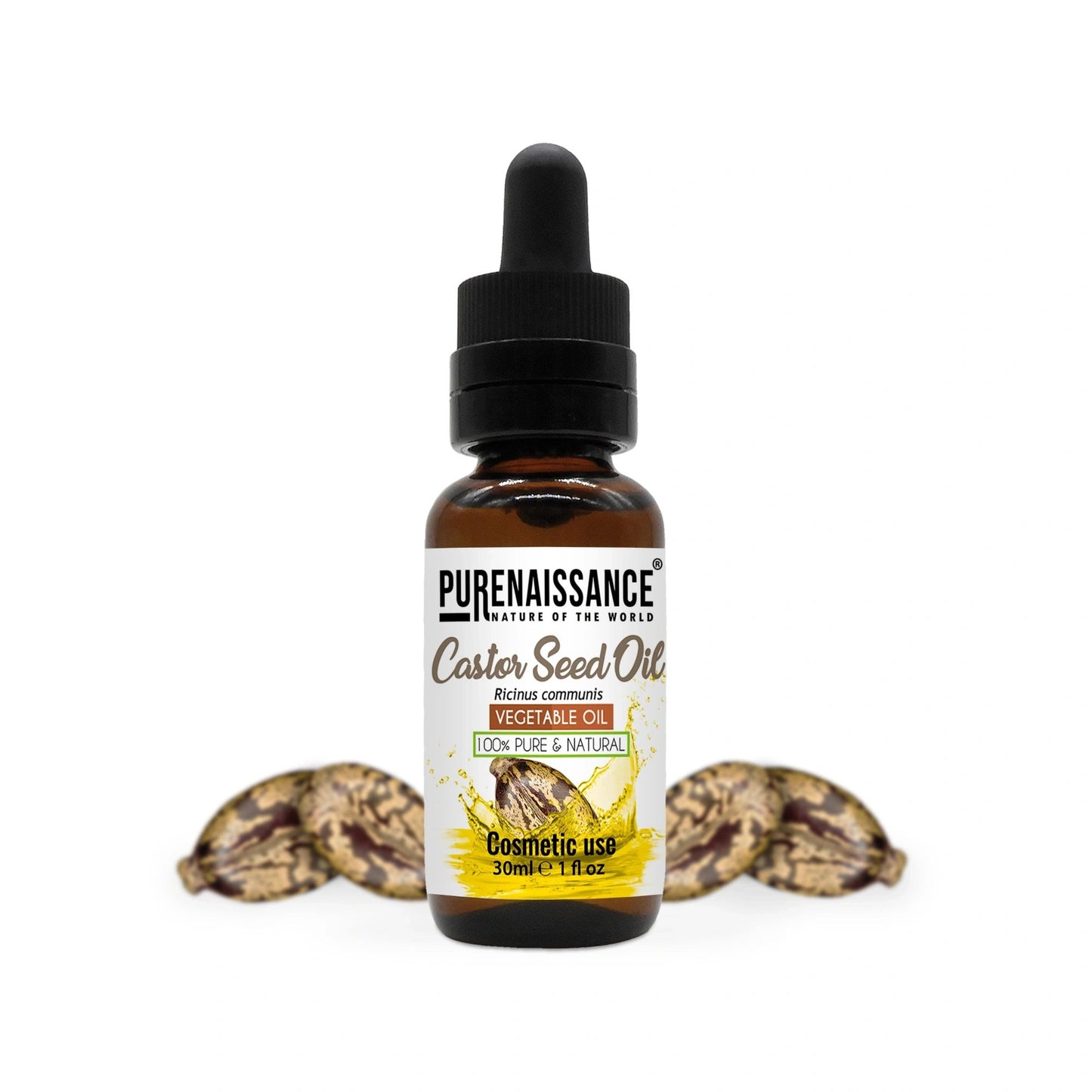Purenaissance
Castor Vegetal Oil/30ml
Castor Vegetal Oil/30ml
Couldn't load pickup availability
What is Castor Vegetal Oil?
Castor oil is a versatile and renewable vegetable oil obtained by pressing the seeds of the castor oil plant (Ricinus communis), a shrub belonging to the Euphorbiaceae family. This plant is mainly cultivated in Africa, South America, and India. Major castor oil-producing countries include Brazil, China, and India. Historically, castor oil was domesticated in Eastern Africa and introduced to China from India approximately 1,400 years ago.
Widely used in cosmetics as a nutrient and softening agent, castor oil forms a protective film on the skin, significantly reducing moisture evaporation and preventing dehydration. With its close affinity to keratin—the main constituent of hair and nails—castor oil is recognized for its strengthening, restorative, and softening properties, especially for eyelashes, hair, and nails. It can be used as:
- A massage oil (alone or blended with other oils).
- A carrier oil for essential oils.
- A fatty component in cosmetic products.
- An ingredient in soap production, where it adds consistency and transparency.
Castor oil is a safe ingredient that can be applied to the skin in any concentration.
Castor Vegetal Oil Technical Data Sheet
Common Name: Castor, Castor Bean
Botanical Name: Ricinus communis
Appearance: Clear, viscous liquid
Color: Colorless to straw yellow
Odor: Faint, mild odor
Botanical Family: Euphorbiaceae
Organ: Seeds
Processing Method: Cold pressing
Type: 100% pure
Origin: India
Preferred Uses: Cutaneous route, internal route
Physical Characteristics
A good-quality castor oil should have the following characteristics:
- Density (g/mL): 0.959
- Thermal Conductivity (W/m°C): 4.727
- Specific Heat (kJ/kg/K): 0.089
- Flash Point (°C): 145
- Pour Point (°C): 2.7
- Melting Point (°C): −2 to −5
- Refractive Index: 1.480
Chemical Composition
The average fatty acid composition of castor oil includes:
- Ricinoleic acid: 85%–95%
- Oleic acid: 2%–6%
- Linoleic acid: 1%–5%
- α-Linolenic acid: 0.5%–1%
- Stearic acid: 0.5%–1%
- Palmitic acid: 0.5%–1%
- Dihydroxystearic acid: 0.3%–0.5%
- Others: 0.2%–0.5%
Storage Conditions
- Store in closed containers in areas with good ventilation.
- Keep away from ignition sources, heat, and direct sunlight.
- Empty containers retain residue and should be properly drained, closed, and disposed of.
Properties of Castor Vegetal Oil
For Health
- Antimicrobial
- Anti-inflammatory
- Antifungal
- Laxative
- Immune Booster
- Antioxidant
For Beauty
- Skin regenerator
- Hair and skin moisturizer
Benefits and Usage Tips
For Health
-
Constipation:
Castor oil acts as a stimulant laxative. A typical dose is 15 ml (about 3 teaspoons), with effects within 2–3 hours. Overuse can cause nausea or vomiting, so consult a doctor if needed. -
Arthritis Pain:
Massage the painful areas with castor oil, followed by a hot water pack to enhance absorption. Perform this process twice weekly for pain relief.
For Beauty
-
Acne and Scars:
- Cleanse your face and apply a few drops of castor oil using a damp washcloth.
- Gently massage in circular motions and leave overnight.
- Use sparingly for oily skin.
-
Delays Signs of Aging:
- Apply castor oil around the eyes, mouth, forehead, and neckline.
- Massage gently and leave for 20 minutes before rinsing off.
-
Hair Growth:
- Massage warm castor oil into the scalp to improve blood circulation and encourage hair growth.
- Leave it on overnight and wash off in the morning.
-
For Eyelashes:
- Apply a thin film of castor oil on eyelashes every evening for at least two months.
-
For Strong Nails:
- Soak hands in cotton gloves dipped in a mixture of castor oil and sweet almond oil. Leave overnight for strengthening nails.
-
Natural Moisturizer:
- Use castor oil alone or mix it with almond, olive, or coconut oil for an ultra-hydrating lotion.
Precautions
- Pregnancy: Avoid castor oil during pregnancy as it can induce labor.
- Diarrhea: Excessive consumption may lead to diarrhea, dehydration, and electrolyte imbalance.
- Allergic Reactions: Always perform a patch test before using castor oil to rule out allergies.
First Aid Measures
- Eye Contact: Remove contact lenses and flush eyes with water.
- Skin Contact: Wash with soap and water. Discard contaminated clothing.
- Ingestion: Do not induce vomiting. Drink water or milk and seek medical advice.
- Inhalation: Move to fresh air. Seek medical attention if discomfort persists.
Share


